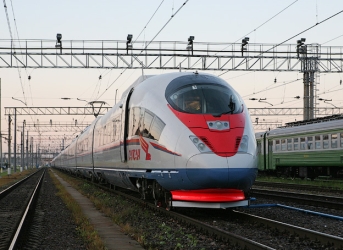The Russian Federation’s development of a free market, capitalist economy since the unexpected collapse of the Soviet Union in December 1991 can most charitably be described as ‘fitful.”
While large portions of the formerly socialist economy have been privatized, large elements of what Soviet economists called “the commanding heights of the economy” have remained in state hands. Even the kleoptoractic administration of Russia’s first President, Boris Yelstin, hesitated to privatize, a process which has proceeded even more haphazardly under his de facto successor (apologies to Dmitrii Medvedev), former KGB member Vladimir Putin.
In this context, it’s well worth remembering that Putin called the collapse of the Soviet Union “the greatest political tragedy of the 20th century,” which hardly endeared him to Westerners.
Perhaps the best known of the Russian Federation’s continuing state monopolies is Transneft, founded in 1993 and operator of the largest oil pipeline system in the world.
Another is Rossiskie Zheleznye Dorogi (RZhD), or Russian Railways, created in 1992 to take over existing lines within Russia, which operates over 53,000 miles of common carrier routes as well as a few hundred miles of industrial routes, making it the second largest network in the world exceeded only by the railway network of the United States.
Russian Railways, which now operates 56 subsidiary and affiliated companies across 13 time zones, describes itself as a “monopoly.” However, in a perfect illustration of the hybrid nature of much of Russia’s monopolies, on 18 September 2003, a decree was passed to separate the Russian Federation’s railways from the control of the Ministry of Transport, with the result that Russian Railways was created as a public company, which nevertheless owned all the Russian Federation’s track, rolling stock and equipment.
In short, still a monopoly, albeit one owned by the public.
But one cardinal principle of monopolies is that the are rarely economically efficient, and in a small sign that the Putin administration is belatedly acknowledging the fact, Russia’s respected business journal Kommersant (“The Businessman”) is reporting that BaltTransServis, operating primarily in the oil products and oil transport segment, has announced plans to build private train routes to improve the oil cargo logistical support which the Russian Railways monopoly is unable to support to the company’s satisfaction.
BaltTransServis head Vladimir Prokofiev told a meeting of the Eurasian Transport Forum that the company is seeking to begin discussions with the Russian government and Russian Railways about the construction of private railways from four Russian oil refineries - Surgutneftegas in Kirishi, Slavneft in Yaroslavl, TNK-BP in Ryazan and Gazprom Neft in Moscow - to the port of Ust-Luga and to Finnish ports. Prokofiev noted that BaltTransServis estimated that the construction of the private single-track railways will cost around $14 billion with 9.5 years needed to recoup the investment, adding, "At the initial stage, we can export on the single-track railway. Then, if there is a demand in the opposite direction, we could build the second tracks and start earning on more cargo." To put the proposed Balttransservis investment in context, in October 2010 Russian Railways announced that its 2010 investment program had increased to €9.81 billion. Prokofiev concluded that the railway project could be implemented with oil companies and portfolio investors, but that the company was taking a wait and see approach for the government’s response.
Balttransservis, founded in 1999 and based in St. Petersburg, is an international transit company and offers railway transportation services specializing in shipping oil products. Since December 2009 Balttransservis has been a subsidiary of Globaltrans Investment PLC of Globaltrans, Russia's largest private freight rail transportation group.
The year 2009 is also notable for the fact the Russian Railways monopoly, asked the government to intervene directly to save its faltering finances.
So, will BaltTransServis get to build its private railway lines, or will the Putin administration get cold feet? Given that BaltTransServis’ proposal is likely to be backed by some of Russia’s biggest oil companies, which use the refineries, along with Gazprom, whose oil subsidiary operates the Moscow facility, the Kremlin is going to undoubtedly hear from some of Russia’s most influential energy magnates. Accordingly, it seems likely that this small chink in a formerly adamantine monopoly may well succeed, especially as energy exports currently account for nearly half of the Russian government’s income.
Lenin would not be pleased.
By. John C.K. Daly of Oilprice.com



















A few observations;
in our experience in the UK railweays, privatised or otherwise hardly ever make a profit. They're lucky if they break even. The UKs split into Railtrack for fixed assets and seperate companies for rolling stock has made both profitability and reliability patchy to say the least. It has taken them nearly 20 years to make European style trains the rule rather than the exception here.
Also the 'competition' is fixed. Specific train companies work specific routes. So there is no 'choice'. And because (presumably) these companies are accountable to shatreholders (and the govt watchdog) they give these people money that could go to improving services (lengthening platforms so trains can be longer so commuters can travel in comfort not like sardins etc.)
I grant you Russia probably could do with modernising and improving her rail system. But outright 'privatisation a la Thatcher' is not always the best way.
What is the best way? I guess the Russians will have to find that out for themselves.